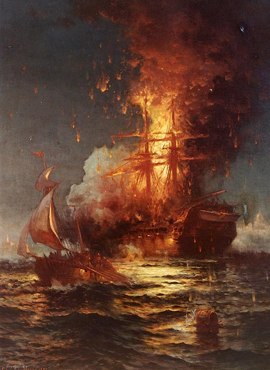

Naval History & Heritage Command photo KN-10849.
Burning the frigate Philadelphia by Edward Moran.
On 23 December, Enterprise captured the ketch Mastico, which had slipped her moorings in Tripoli Harbor with intentions of sailing to Constantinople. Instead, Commodore Edward Preble order her to be fitted out at Syracuse and renamed Intrepid.
On 3 February 1804, with Decatur in command and Brown among the volunteer crew, Intrepid sailed for Tripoli Harbor. On the 16th, in an action that Admiral Horatio Nelson is said to have called “the most bold and daring act of the age,” her crew succeeded in boarding and burning the frigate Philadelphia, which had been captured after running aground on 31 October 1803.
On 20 February, Brown returned with Decatur to Enterprise and took part in the gunboat attacks and bombardments of Tripoli. On 20 September, he was transferred to the frigate John Adams and sailed in her to the United States. He was detached on 22 March 1805. No further record of naval service has been found.
On ruse of having lost anchor, the pilot of Intrepid convinced the Tripolitans on board Philadelphia that the ship was a merchantman out of Malta and secured permission to make fast to the captured frigate’s line. Decatur was up Philadelphia’s mid-chains in an instant, followed by sixty men and officers including Brown, who carried the entire fight to the Tripolitans with the sword, swept them overboard and remained until flames appeared skyward from Philadelphia’s hatchways and ports. As Intrepid got from alongside the frigate, flames shot up to the top rigging and Philadelphia’s loaded guns became so hot they went off broadside to the town. Not more than fifteen minutes from time of boarding, the brave men were making their way out of the harbor under fire of enemy shore batteries.
The astonishing feat had been accomplished at the coast of only one man slightly wounded. Before they were out of the harbor, Brown had the satisfaction of seeing the Philadelphia, a veritable torch, drift under the Bashaw’s castle where she was completely consumed. Decatur reported the coolness and intrepidity of his men was such “As I trust will ever characterize the American Tar.” This “most daring feat of the age” brought a new respect and luster for America and greatly increased the prestige of the United States and her Navy throughout the world. Two months’ pay was awarded each of Intrepid’s crew and Congress voted Decatur the present of a sword with grateful thanks for achieving a task of national importance.
Source: Naval History & Heritage Command including Dictionary of American Naval Fighting Ships.